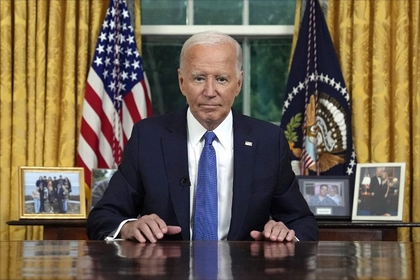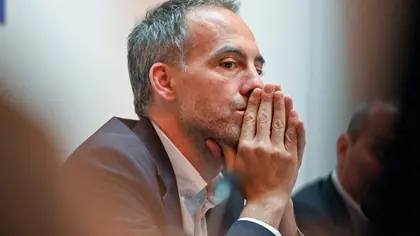Whatever hope remained that the French left may find common ground ahead of June’s EU elections has collapsed over the radically different approaches to handling and resolving the war in Ukraine.
Recent weeks and days have seen just how divergent France’s left-wing movements were in their approach to Ukraine – from what help Paris should provide to the best strategy to end the war.
JOIN US ON TELEGRAM
Follow our coverage of the war on the @Kyivpost_official.
France’s parliamentary debate on Ukraine on Tuesday (12 March) saw the chamber sharply split on Paris’ bilateral security deal with Kyiv.
It is another blow to the unity of left-wing parties, as hopes for an overarching alliance have all but disappeared over the past two years – despite Jean-Luc Mélenchon’s La France Insoumise (LFI) party scrambling together the ‘NUPES’ parliamentary alliance on the eve of legislative elections in June 2022, hoping to agree a common platform ahead of EU and national elections.
But with disagreements over geopolitics and EU affairs, unity is proving more distant than ever. In October, the Socialists suspended their participation in the ‘NUPES’ coalition after LFI refused to label Hamas as a terrorist group – bringing the alliance to a virtual standstill.
French President Emmanuel Macron’s comments last month about not excluding the option of sending troops to Ukraine – should the need arise – have once again exposed profound divisions.

‘History Lies in Your Hands’ – Ukraine at War Update for July 25
Divisions on how to end the war
University College London (UCL) political scientist Philippe Marlière told Euractiv that tensions were not new, but “they’re flaring up again”.
For LFI and the Communists, anything short of an immediate ceasefire and negotiations over Ukraine’s borders means “taking the risk we go for a full blown-out war”, said LFI MP and party spokesperson on the issue, Arnaud Le Gall.
On Tuesday, the far-left cast a symbolic ‘no’ vote to sanction the French government’s strategy over the war in Ukraine. They also said Macron’s recent signing of the bilateral security deal – in line with G7 declarations – would fan the flames of the conflict.
The LFI and Communists, instead, want an international conference led by the OSCE (Organisation for Security and Cooperation in Europe) where all sides’ demands – including Russian President Vladimir Putin’s – are considered.
The international community has made clear that negotiations will only start when Kyiv says so.
Le Gall explained that negotiating a way out, rather than warmongering, should be everyone’s focus. According to him, expanding EU efforts to ship weapons to Ukraine, as leaders consider deliveries of medium-to-long-range missiles, is just the wrong way to go.
He rejects the very thought of sending troops, while also calling for EU member states, first and foremost France, to leave NATO – a long-lasting LFI position.
This stance attracted heavy criticism from the Greens and social-democrats, for whom sitting down at the negotiations table with Putin amounts to playing into his hand.
“Those against support for Ukraine get pacifism and submission to tyrants confused. They think peace is achieved by giving in to tyrants, [but] it’s by standing firm that we contribute to peace,” socialist EU lead candidate Raphaël Glucksmann said on French radio RTL on Tuesday.
The member of the European Parliament, who made a name for himself digging into foreign interference in EU affairs, wants to see Russia “lose”, and favours further military and financial support to Kyiv.
“Putin does not want peace, we better accept it,” Glucksmann’s Place publique party’s co-president and MEP Aurore Lalucq told Euractiv.
Pressing for negotiations with Putin’s Russia, by extension, is meaningless: “It is what stops us from ever seeing eye to eye [with LFI and communists], be it at political or philosophical levels,” the lawmaker said.
Questions over Ukraine accession
It isn’t just short-run support left-wing parties disagree on – but also the extent to which the EU ought to pave the way for Ukraine’s accession.
For the far-left, it’s a no-go, arguing that it would bring salaries down and encourage industry divestment from France and toward Eastern Europe.
It would amount to a slap in the face for French farmers, they argue, as Ukraine grain exports would pull prices down.
Bringing Poland, Hungary and Romania into the club in the 2000s amounted to “silent cataclysm”, LFI rising star François Ruffin wrote in January in an open letter to Glucksmann. It caused “the destruction of a million industrial jobs” – and today’s not the day to repeat the mistake with Ukraine, he said.
But that, again, couldn’t be further from how social democrat and green forces see long-term developments.
Opposing French farmers and war-torn Ukrainians is the wrong way to go, Lalucq said.
“Farmers’ suffering is the result of poor policy-making, which must be changed. But the EU is also a rich continent, which can offset economic risks associated with Ukraine joining the EU,” she explained, calling on left-wingers to revert to genuine “internationalism”, rooted in “solidarity”.
On the other hand, “LFI’s internationalism doctrine isn’t constant,” Marlière argued. “Mélenchon still thinks in Cold War terms, with East and West camps – but this dichotomy no longer holds today.” Its leader’s anti-US narrative clashes with the reality of the war, the scholar told Euractiv.
Less than 90 days out from the EU elections, the gap separating different left-wing forces shows no sign of shrinking. And with the depth of splits that the war in Ukraine has exposed, a politically united front is a long way off.
You can also highlight the text and press Ctrl + Enter







